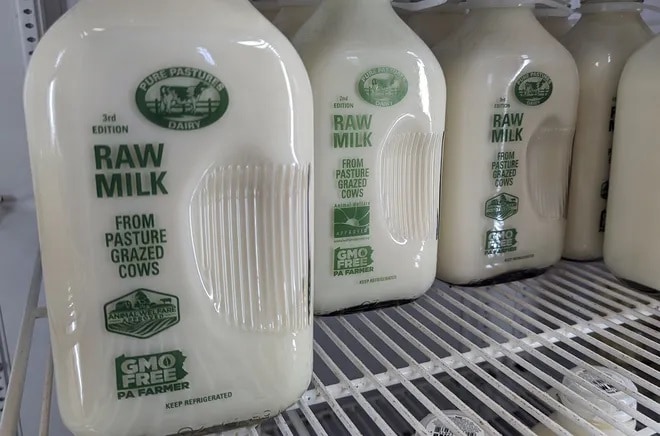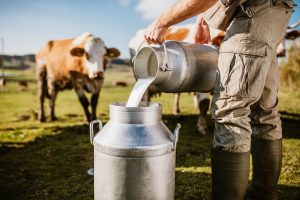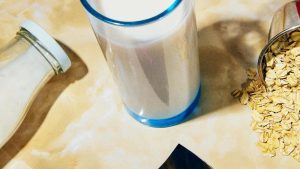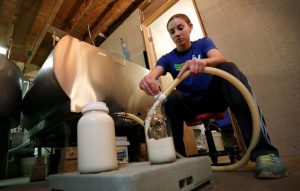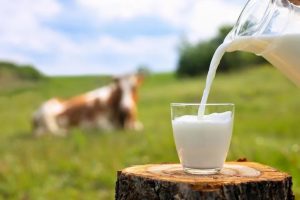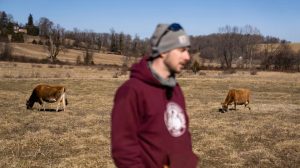
Rowan Miller grew up drinking raw milk – to her it was the “norm” – and it has never made her sick.
She grew up on a sheep farm in the Falkland Islands, an archipelago east of the Southern Patagonian coast. Now she owns Rowntree Farm in Mechanicsburg.
At her stand in York’s Central Market, she offers pasture-raised meat, eggs and a variety of dairy products from Apple Valley Creamery in East Berlin, including raw milk, which is one of her best-selling items.
“I tell friends that raw milk has all of the components within it to help keep pathogenic bacteria at bay when the milk is collected and kept in a safe manner,” Miller said. “Most dairies that offer raw milk do rigorous testing and produce a safe product, in my opinion.”
In the last few years, raw milk has made waves on social media, being shared for its positive health benefits. It has also had its share of negative media attention − and is even banned in several states.
What is it, and is it legal?
Raw milk is minimally processed, homogenized milk that comes straight from the animal, whether it’s from a cow, sheep or goat – in a way, it’s the milk equivalent of natural wine.
It’s milk that has not been treated by pasteurization, which kills bacteria, yeasts and molds while increasing the product’s shelf life.
Though the flavor is not far off from regular, pasteurized whole milk, raw milk is rich and offers a creamier taste.

It is legal to produce and sell raw milk in Pennsylvania if the farm is permitted and inspected by the Department of Agriculture to do so, to reduce health risks associated with unpasteurized products. Several other states, including Arizona, Utah and New Hampshire, to name a few, have also legalized selling raw milk.
Surrounding states such as Maryland, New Jersey and Delaware prohibit the sale of unpasteurized milk intended for consumption.
According to the Centers for Disease Control, from 2013 through 2018, 75 outbreaks of campylobacter, shiga toxin-producing e. coli or salmonella, reported to the CDC were linked to raw milk.
These outbreaks included 675 illnesses and 98 hospitalizations.
Pa. Dept. of Agriculture warns against raw milk products from local farms
In January this year, The Pennsylvania Department of Agriculture warned consumers to discard all Conoco View Dairy raw milk sold in Cumberland, Juniata, Perry, Snyder and York counties after 11 reports of campylobacteriosis illnesses in December and January and they confirmed campylobacter contamination in the dairy’s products.
Several weeks earlier, the Pennsylvania Attorney General’s Office, in conjunction with the state Department of Agriculture, filed a lawsuit against the owners of an Amish farm, Miller’s Organic Farm in Lancaster County, after two reported E. coli illnesses were alleged be traced to their milk.
Amos Miller, the owner of Miller’s Organic Farm was accused of failing to obtain the proper licenses and permits to sell raw milk legally.
The action was taken after years of attempts by state and federal officials to bring the farm into compliance with the law, according to a news release.
In December 2023, a report came from the New York State Department of Health of a confirmed positive case of illness caused by the foodborne pathogen Shingatoxin producing E. coli in an underage individual who consumed raw eggnog reported to be from Miller’s Organic Farm.
The eggnog tested positive for STEC, according to the lawsuit.
Nine days later, the Department of Agriculture received one more confirmed case of STEC in another underage individual from Michigan who received raw milk and other products from Miller’s Organic Farm.

An “unexplainable” growth in raw milk sales
Apple Valley Creamery, a small, sixth-generation dairy farm and creamery in East Berlin, has been operated by the Stoner family since 1928. The farm is currently owned and operated by Larry and Sharon Stoner and their family.
And with a large operation like theirs, it’s all hands on deck.
They produce 4,000 gallons of milk each week, by about 100 cows on the property. The milk is delivered daily to 100 local businesses and households, approximately 700 each week.
Apple Valley Creamery offers whole, skim, low fat, half and half, heavy cream and raw milk. By the end of 2022, Stoner said, the increase in raw milk sales was “unexplainable.” He believes COVID may have played a role in that, making people more health conscious.
According to Stoner, the main difference between producing raw milk to pasteurized is the milking equipment and the harvesting process. “Everything has to be extremely clean,” he said. Having healthy and well-fed cows is important to produce a healthy product.
Modern technology allows for dairy farmers, including Stoner, to monitor the health and physical activity of their cows through a collar the animals wear around their neck, detecting the overall health of the animals.
It’s called an activity monitor, and it’s similar to a fit bit. “It helps for heat protection, breeding, to detect sickness, if the cow’s not eating as much as she normally would.” Additionally, the farm only plants and feeds non-genetically modified crops to the cows.
Here’s how some York countians feel about raw milk
In an attempt to understand York County’s opinion on raw milk, a poll was created on the Fixing York Facebook group, where the community voted on whether or not they are a fan of raw milk. 84 group members voted yes, 82 voted no, and 104 expressed their curiosity to try it.
Jody Hunt of York has worked on farms for the last 20 years.
While she does still drink pasteurized milk purchased at the supermarket, Hunt enjoys the occasional raw milk and said she has never seen negative effects from consuming it. Hunt recommends drinking it in moderation. “My advice is not to drink too much raw milk because our systems are not used to it.”
Angie Zinn was introduced to raw milk five years ago and said her overall health has been positive before and during her consumption of raw milk.
“Most people that learn about my raw milk drinking are curious and nonjudgmental. They know that I care about fitness and figure that I know what I’m doing,” Zinn said. She will often purchase the milk from a farm or a market she trusts.
Ian Montgomery of Red Lion does not believe in the positive health effects of consuming raw milk and said the trend is reminiscent of “anti-vaxxers.”
“Raw milk isn’t pasteurized. It’s one of those things that, in our modern convenient society, we forget its importance.” Montgomery emphasized the role that pasteurization and vaccines play in our overall health and said while he does not believe raw milk should be illegal, he thinks consumers of the product should understand the risks.
